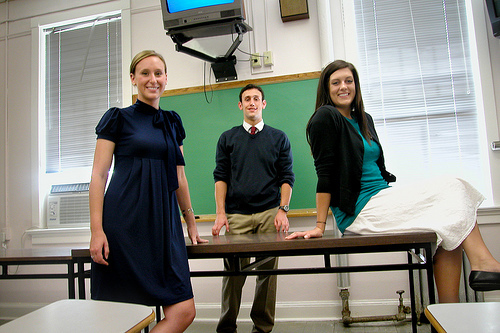As shifting employment opportunities and reform movements alter the U.S. education landscape, one organization has received steadily increasing support from lawmakers.
Teach for America (TFA) began as Wendy Kopp’s senior thesis in 1989. A Princeton University undergraduate, Kopp wanted to improve poverty-stricken urban schools by recruiting young, enthusiastic, and persistent college-educated adults into education. In 1990, 500 new college grads joined the first TFA class as teachers who bypassed traditional teacher education.
Kopp started “a Peace Corps for urban education,” said Alan Borsuk, a senior fellow at Marquette University Law School. “There was a much bigger need then for a shot in the arm for urban teaching, a lot of jobs open, and it tapped into a realistic [desire] that college grads had that they wanted to do something to help.”
Now TFA is active in almost half the states, this year supporting more than 10,000 young teachers. Donations provide 70 percent of TFA’s income, with governments picking up the other 30 percent. TFA recruits heavily from Ivy League and top-rated public universities, and was listed as one of Fortune’s top 100 companies to work for in 2013. Corps members commit to a two-year stint in needy public schools.
Study Says
Teach for America has been controversial, however, because its teachers get good results from students with only a summer of teacher training before their two-year placement.
Studies in Tennessee, Louisiana, and North Carolina have found students with TFA teachers learn as much as or more than those with traditional teachers.
This March, another study found students of TFA members learn more.
The Edvance Research study found Texas middle school math students of TFA corps members received more than half a year more of learning than students in the classrooms of other early-career teachers. Middle school reading students of TFA alumni received more than half a year of extra learning than students in other classrooms, and in middle school math classrooms TFA alumni got almost an entire year of extra learning into their charges’ minds.
Attracting Lawmakers
In February, the Virginia legislature unanimously passed a bill changing teacher certification to allow TFA into the state.
The licensure changes will allow districts and principals to partner with TFA as an additional source of quality teachers, said Kaitlin Gastrock, a TFA spokeswoman.
The legislation would let TFA partner with “in need” districts, meaning those with a significant achievement gap between white and minority students.
“We’re eager to join efforts to expand educational opportunities for kids,” Gastrock said.
Teach for America does not currently operate in West Virginia, either, but the governor has proposed increasing alternative licensure options. Though the original bill was halted, Gastrock said the potential for expanding into the state is good because the legislature commissioned a study of alternative teacher certification.
Welcome to Milwaukee
Wisconsin’s largest city has also seen more TFA members since they began teaching in Milwaukee four years ago. Gov. Scott Walker recently allocated $1 million over two years to support plans for doubling Milwaukee’s 50 TFAers.
“This is the first time we’re being considered in the budget,” said Maurice Thomas, director of TFA Milwaukee. “I think it’s the results that we’re seeing in our schools and with our teachers.”
In Milwaukee, TFA teachers have staying power—after their two-year commitment, approximately 60 percent remain in the Milwaukee education community.
“Our teachers are being very creative and strategic in combating poverty in their classrooms, and they are seeing that it is solvable,” Thomas said. “They are becoming convicted about the city of Milwaukee.”
Job cuts four years ago meant many TFA alumni moved into private and charter schools, some of which utilize vouchers.
“TFA is thought of very highly in [Milwaukee] private and charter schools,” Borsuk said. “Now Milwaukee public schools are having a hiring wave and asking for more TFA.”
Evolving Organization
What began primarily as a movement to address needy urban students has evolved. A growing number of TFA educators have been filling positions in charter and private schools in some states.
“Right now the geography of the issues has changed,” Borsuk said. “There isn’t a shortage of people who apply to be teachers in urban areas, and so the need is a little different. There are a lot of schools closing, so the market has changed some.”
The nationally known Rocketship charter school organization is opening its first school outside of California in Milwaukee, and it’s relying heavily on TFA partnerships to do so. Currently, about 50 percent of Rocketship staff are first- or second-year TFA members.
Rocketship aims to eliminate the achievement gap between high and low-income children within the next generation, and it integrates uncommon amounts of technology with a highly competitive teaching staff to do so, said Kevin Bechtel, Rocketship’s national development manager.
“These individuals are really the ones who can transform communities,” he said. “TFA is attracting and recruiting some of the best leaders in the country. Perseverance is really important in the world of education reform.”
TFA recruits have “really high-quality raw talent,” he said.
Unlike most teacher preparation, TFA provides ongoing training for its teachers, and it allows alumni to continue training with them past their two-year commitment.
“They’re trying to build a long-term cadre of education activists who will be healthy contributors to the education scene,” Borsuk said.
Image by Tulane Publications.




